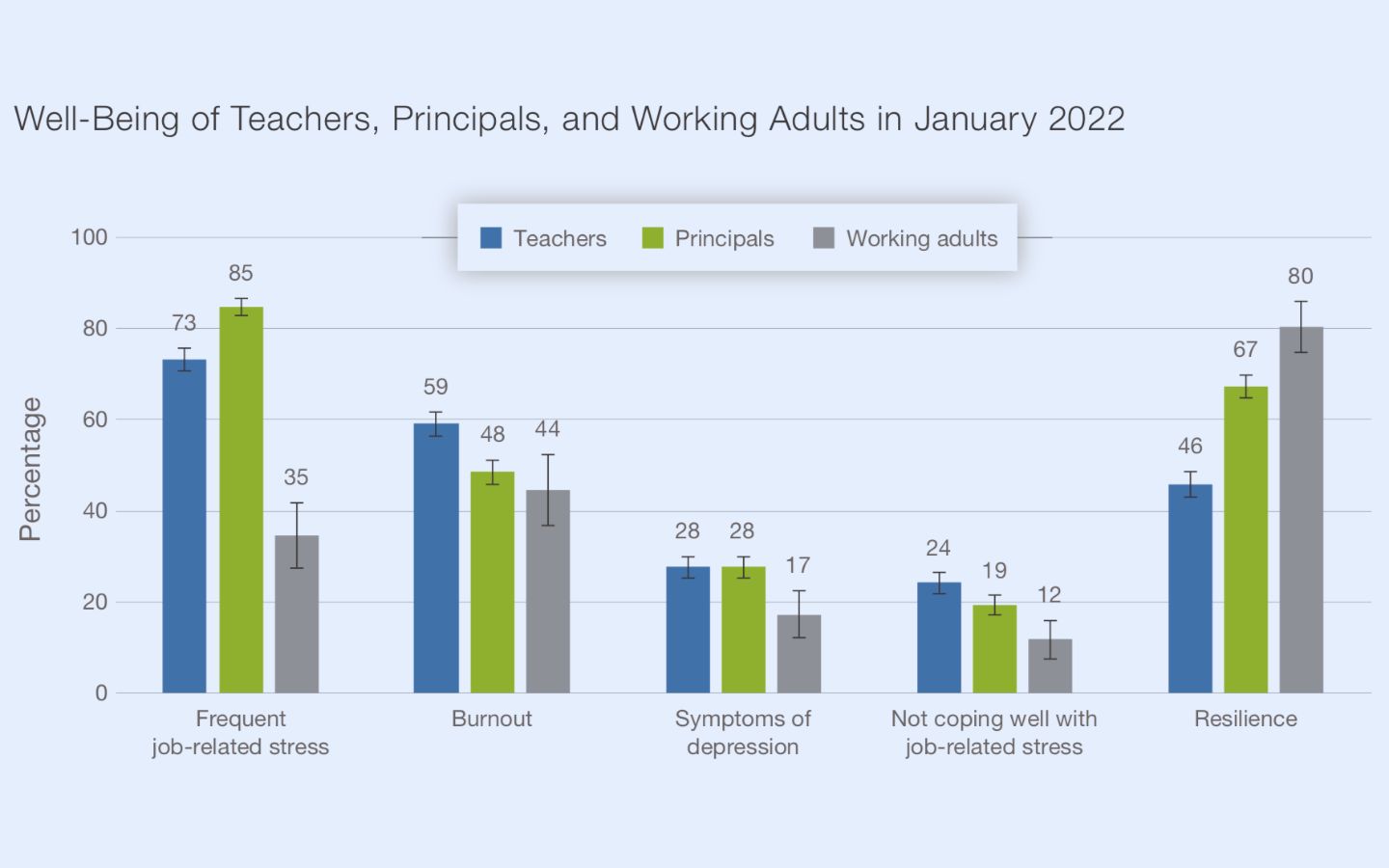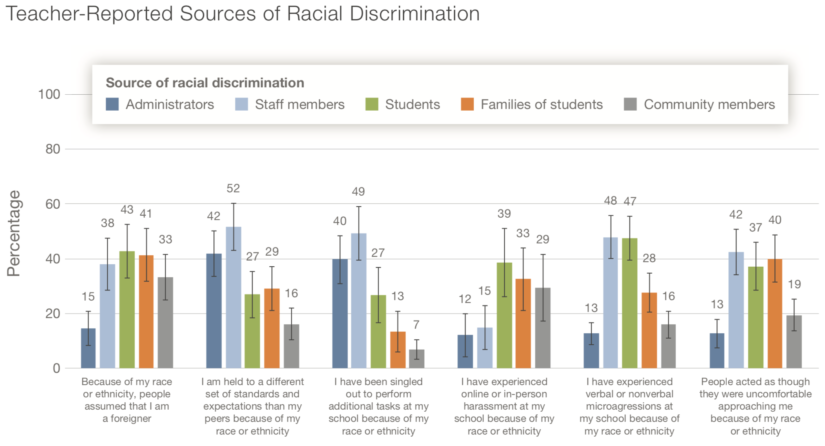Survey: Pandemic Learning Loss is Teachers’ Top Source of Job-Related Stress
Rand report finds most teachers, principals are coping OK, but says focus on well-being is ‘essential for pandemic recovery’

Get stories like these delivered straight to your inbox. Sign up for The 74 Newsletter
Educators experience more than twice as much job-related stress as other working adults, and about half of teachers say trying to help students make up for lost instructional time is their greatest source of anxiety, according to a new survey.
The Rand Corp. report shows this year has been especially tough on Latino teachers, with one in three reporting symptoms of depression, compared with one in four non-Latino teachers. Black teachers, however, were less likely to report stress on the job than White and Latino teachers, the researchers found.
“Repairing” teacher and principal well-being, they wrote, “is essential for pandemic recovery” and leaders shouldn’t view it as a short-term problem that will fade once COVID-related disruptions pass.
“Stress on the job can negatively affect educators’ physical health,” said Elizabeth Steiner, lead author of the report. “And poor well-being is linked with lower quality student learning.”
While most educators — about three-fourths — say they’re able to cope with the added pressures, the findings reinforce comments from teachers who say this school year has been the most grueling since the pandemic began. The Rand findings echo the results of a Gallup poll released this week and confirm earlier surveys suggesting sizable percentages of teachers want to leave the profession. The Rand survey shows about a third of educators report plans to quit — up from a quarter of teachers and 15% of principals in January 2021.
The findings point to multiple factors contributing to job dissatisfaction and intentions to leave. In addition to addressing learning loss, other pandemic-related stressors included taking on additional responsibilities because of staff shortages, harassment over COVID policies and balancing child care responsibilities.
But some sources of stress, such as racial discrimination, predate COVID. More than half of teachers said other staff members hold them to a different standard because of their race, and two-thirds of principals said they have faced online or in-person harassment from students’ families because of their race or ethnicity.

Staying ‘past the burnout stage’
The increase in teachers saying they want to leave doesn’t mean they will, nor does it predict “a major disruption in the workforce,” the authors wrote. But Colin Sharkey, executive director of the Association of American Educators, a nonunion group, said an exodus of teachers could be a “lagging indicator.”
”It will take time for educators to follow through on a decision that was likely made during this time period,” he said, adding that many educators might stay “past the burnout stage,” to the point that they’re “unrecoverable.”
The Rand findings are based on responses from 2,360 teachers and 1,540 principals, collected in January. The researchers compared the answers to those from a nationally representative sample of working adults. They also interviewed 60 teachers to better understand their experiences.
Roseangela Mendoza, a middle school social studies teacher at The Ethical Community Charter School in Jersey City, New Jersey, is among those who found the return to in-person learning particularly challenging.
“We were exhausted by October” of 2021, she said. “It’s been the worst stress that anybody has ever gone through.”
Teaching assistants have been covering classes when teachers are absent, leaving lead teachers without their usual support, Mendoza said, adding that students, who learned remotely for a year and a half have trouble staying focused and are always bouncing out of their seats to socialize or go to the bathroom.
“They will question you, ‘Why do I have to do this?’ ” she said. Parents also challenge her, asking that their children get extra time to complete work. “Tons of parents want to tell us what we have to do.”
But she says she still believes in the mission of her school, which she joined not long after it opened in 2009, and likes that she can be creative in planning curriculum. Her lessons include making tortillas and quilting.
“That flexibility is what keeps me here,” she said.

The report also points to conditions that make educators feel better about their jobs and less likely to leave, such as involvement in school decision-making, strong relationships with colleagues and access to mental health support.
Teachers and principals with access to at least one mental health program, such as a peer support group or counseling, were significantly less likely to say they were considering leaving their jobs, the survey found.
Many districts have been using federal relief funds to address students’ mental health needs, but some are expanding services for staff as well. The Moore Public Schools, near Oklahoma City, used a new state grant program to add eight positions for mental health professionals, including two employee assistance providers.
The district revamped an unused building into offices with private entrances where employees can see a therapist.
“I think it’s pretty rare,” said Kristi Hernandez, the district’s director of student services. “Most schools partner with outside providers.”
Teachers also just want to focus on teaching and spend less time on other responsibilities , such as meetings and bus duty, the Rand researchers found. And in their interviews with teachers, they heard that pay raises wouldn’t necessarily reduce the stress, but could convince teachers to stay in the field.
Principals listed staffing challenges as their greatest source of stress. But some feel the worst of the pandemic is finally behind them.

“A year ago we were doing temperature checks. We were doing masks,” said Adam Lane, principal at Haines City High School in central Florida, south of Orlando. “The past two and a half years were the most challenging thing we’ve ever had to deal with.”
He said he just attended a statewide administrators conference, where the mood had noticeably lifted.
“We were laughing, drinking, collaborating,” he said. “Even though it was stressful, it was so rewarding to make it through.”
Get stories like these delivered straight to your inbox. Sign up for The 74 Newsletter


